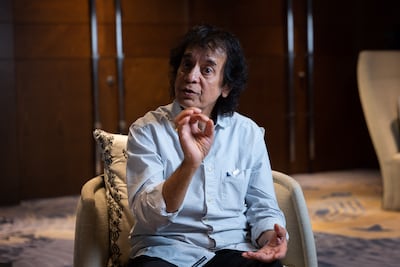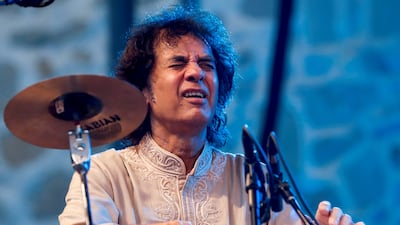Zakir Hussain says he owes a large part of his career to a Beatles member.
It was 1972 and the revered Indian tabla player was creatively restless.
Renowned for his prodigious talent, courtesy of training under his master percussionist and composer father Alla Rakha, it was during a tour with sitar virtuoso Ravi Shankar that Hussain was invited by George Harrison to London’s Trident Studio 40 years ago this month. It was to record Living in The Material World, the English guitarist's follow up to the 1970 masterpiece solo album, All Things Must Pass.
"I remember I asked George 'Why aren't you playing sitar on this album?' and I took it a step further and said 'Why don't you play the sitar on stage?' Hussain tells The National.
"And George says to me: 'I don't want to insult my teachers by playing the sitar badly on stage. It is not my instrument and I haven't grown up with it.
“'But I can take that music and I can transpose it on my guitar, which I have more control over, and offer my reverence and respect to the art form'.”
The response resonated with Hussain who, at the time, was thinking of ditching the tabla and instead play drums on Living in the Material World — an offer Harrison rejected.
"George looked at me and said ‘You are here because you have something unique to offer. If you want to play drums, that's fine. But then you will join the 5,000 other drummers who are waiting in line to play with me and you will have to work your way up to get here,’” Hussain recalls.
“That was the day I dropped the idea of wanting to be a rock drummer and focus on making my instrument speak all the languages of rhythm that exists on this planet. I can't thank George enough for straightening me out.”
An open conversation

For the next four decades Hussain, 71, highlighted the ethereal and technical beauty of the tabla.
With more than 60 albums, he presented the 18th century percussive instrument — a pair of twin drums made of hollowed out wood, clay or metal played by hand — as a foundation of classical Hindustani music, as well as a vibrant accompaniment to jazz, rock and world music tracks.
It was a journey that's also brought him to Oman where he received the Life Time Achievement Award on Saturday, as part of the Aga Khan Music Awards ceremony at the Royal Opera House Muscat..
“It is a great pat on the back that tells me I am on the right track and I should keep going," he says of the distinction.
"I look at it as the beginning of the next phase of my journey towards something we all try to achieve, which is perfection."
It also means jet lag. Hussain is in Muscat for a mere 12 hours before resuming his European tour in Paris the following day.
A reason for all the movement is the release of two varied albums — ZaRa and In the Groove.
Both varied releases encapsulate Hussain’s eclectic approach.
The former is a classical Indian music song collection performed with Rakesh Chaurasia, a leading purveyor of the bansuri, an Indian a side-blown bamboo flute, while In the Groove is the latest release by Planet Drum, a percussion super-group led by Mickey Hart from the psychedelic rock band Grateful Dead.
With Nigeria's Sikiru Adepoju on the apala (a West African hour glass shaped drum) and Puerto Rico's Giovanni Hidalgo on the congas and timbales, Planet Drum deliver another intoxicating exploration of the spiritual and primal power of percussion.
Hussain has been part of the influential group since its inception in 1991, the year it won the Grammy Award for inaugural Best World Music Album for the eponymous debut.
They maybe different rhythms, but the approach is the same.
"When you are on a journey, you don't know what's out there. So you have to mould yourself to whatever is going on and go with the ebb and flow," he says.
"When you are relaxed and you open up, the music comes out with thoughts of the moment and you are able to converse and interact with players from all genres."
From father to son

Such a serene state come with rigorous training.
Hussain felt the rhythm as a child, growing up in a household and tabla school run by his father. He recalled his father being weary of his initial desire to become a student.
"I imagine this being quite common because a teacher does not teach the student, instead the student must extract the information and inspire the teacher to teach," Hussain says.
"While it was paramount in my father's mind that his (musical) line should continue, it was important for him that I have to ask for it.
“By being removed from me, in that regard, it was like him saying 'you find your way to my door' and be in a position where you are able to knock with authority and commitment.”
The rigours from such traditional training not only results in new generations of venerable Indian artists, such as Talvin Singh and Rimpa Silva, but the creation of a tightly knit global community to ensure the beats go on.
"If a tabla player has trouble in New Delhi, I will hear about it in San Francisco and before long, we are in zoom meeting to see how we can help,” Hussain says.
“This is what we did during Covid-19 for instance, where we supported each other and shore up the ones less fortunate among us and made sure they were able to financially survive and not sell their instruments.
“We formed a chain from the connections we forged around the world and make sure everyone is looked after.”






















